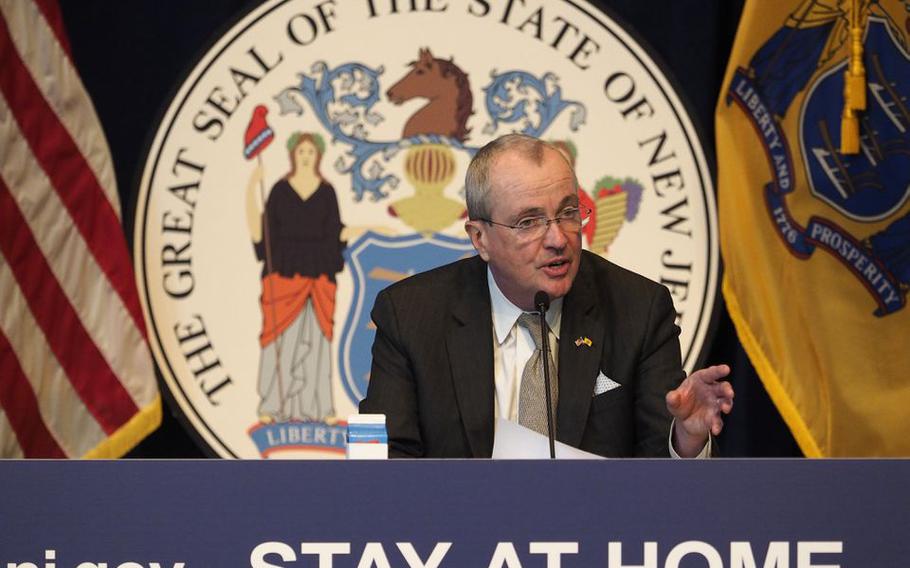
Gov. Phil Murphy speaks at one of his COVID-19 briefings in Trenton in June 2020. (Patti Sapone/TNS)
Stars and Stripes is making stories on the coronavirus pandemic available free of charge. See more stories here. Sign up for our daily coronavirus newsletter here. Please support our journalism with a subscription.
(Tribune News Service) — Gov. Phil Murphy on Tuesday reiterated his long-standing promise that New Jersey will conduct a review of the state’s response to COVID-19, including how it handled the crisis in long-term care facilities — yet he said he still does not have a time frame for when that will happen.
“I don’t have a date for you, but we’re committed to it,” Murphy told reporters after an unrelated event in Passaic City.
His comments come 2 1/2 years into the pandemic and after the state agreed last week to pay a second round of settlements totaling $15.9 million to 71 families of residents who died in New Jersey’s three state-run veterans homes in the early days of the coronavirus’ spread.
An earlier agreement in December to resolve wrongful death claims paid out nearly $53 million to the families of 119 residents who died from COVID-19 in the veterans homes between March and May of 2020.
The state admitted no wrongdoing as part of either settlement agreement.
At the same time, employees at the veterans home at Menlo Park have filed lawsuits alleging the state, the state Department of Military and Veterans Affairs, the governor’s office, and administrators of the nursing home put them in harms way as the virus struck. The complaints accuse the state of being “grossly negligent, knowingly careless, and reckless.”
MORE: Lies about deaths, orders not to wear masks: Lawsuits by staff allege chaos in N.J. veterans homes as COVID soared.
Murphy was asked Monday about the state’s response to the settlements and lawsuits.
“Not a lot to say, other than God bless our veterans and the lives of those that were lost and the families,” the governor said. “Hopefully the settlement that was announced on Friday — which is the second of its kind — in some small way allows the families to move on as compared to something that would have been drawn out. These things settle for different reasons … unique to each situation.”
Asked if that means there won’t be a post-mortem on the state’s response to the pandemic, Murphy said: “There absolutely will be a post-mortem.”
The governor noted the state “hired a firm to do a no-holds barred assessment of long-term care procedures, policies, laws as a general matter.”
In 2020, the Murphy administration hired healthcare consultant Manatt Health to investigate how New Jersey nursing homes responded to the pandemic as the death toll spiraled out of control. New Jersey was forced to seek emergency assistance from the Veterans Administration and the National Guard — moves that were criticized as being too little and too late.
The consultants concluded that long-term care facilities overall were underprepared and under-staffed to deal with the pandemic, and called for tougher state scrutiny. But the study did not scrutinize the state’s performance.
“A lot of things have come out of that,” Murphy said Monday. “Laws that I’ve signed, executive orders, changes in practices and policies. “None of that is in lieu of what will be a complete post-mortem, not just for veterans homes or long-term care but for the entirety of the pandemic.”
“Unfortunately, we still have just under 1,000 people still in the hospital as I sit here today,” he added. “It is clearly something we’re living with, but we’re also clearly not out of the woods.”
Murphy first promised a post-mortem on the state’s handling of COVID-19 in April 2020, when New Jersey was still dealing with the initial spread of the virus.
“We’re going to do our own post-mortem in terms of where were we prepared, where were we not prepared?” he said during one of his then-daily coronavirus briefings in Trenton. “I don’t know how that’s going to take shape, but I promise you that we can do that.”
The Democratic governor has faced repeated criticism from Republicans over how the state responded to the crisis in long-term care facilities. Notably, one Democratic lawmaker, state Sen. Nia Gill of Essex County has publicly called for a bipartisan committee to investigate.
New Jersey, a state of 9.2 million residents, has reported more than 34,000 COVID-19 deaths since the state reported its first case in March 2020. More than 9,500 of those deaths have been among residents and staff members at nursing homes and other long-term care facilities, according to state data.
The state on Monday reported another 604 confirmed COVID-19 cases and three deaths as its seven-day average for confirmed positive tests fell to 1,774 — a 17% drop from a week ago and a 39% drop from a month ago. Murphy and other officials have repeatedly said the pandemic is not over, but residents should protect themselves by getting vaccinated and learn how to live with the virus.
NJ Advance Media staff writers Susan K. Livio and Ted Sherman contributed to this report.
©2022 Advance Local Media LLC.
Visit nj.com.
Distributed by Tribune Content Agency, LLC.